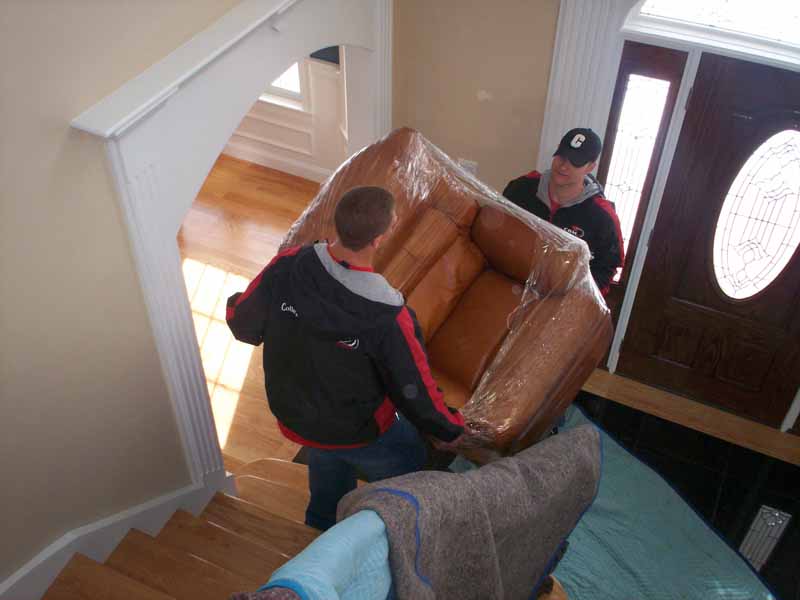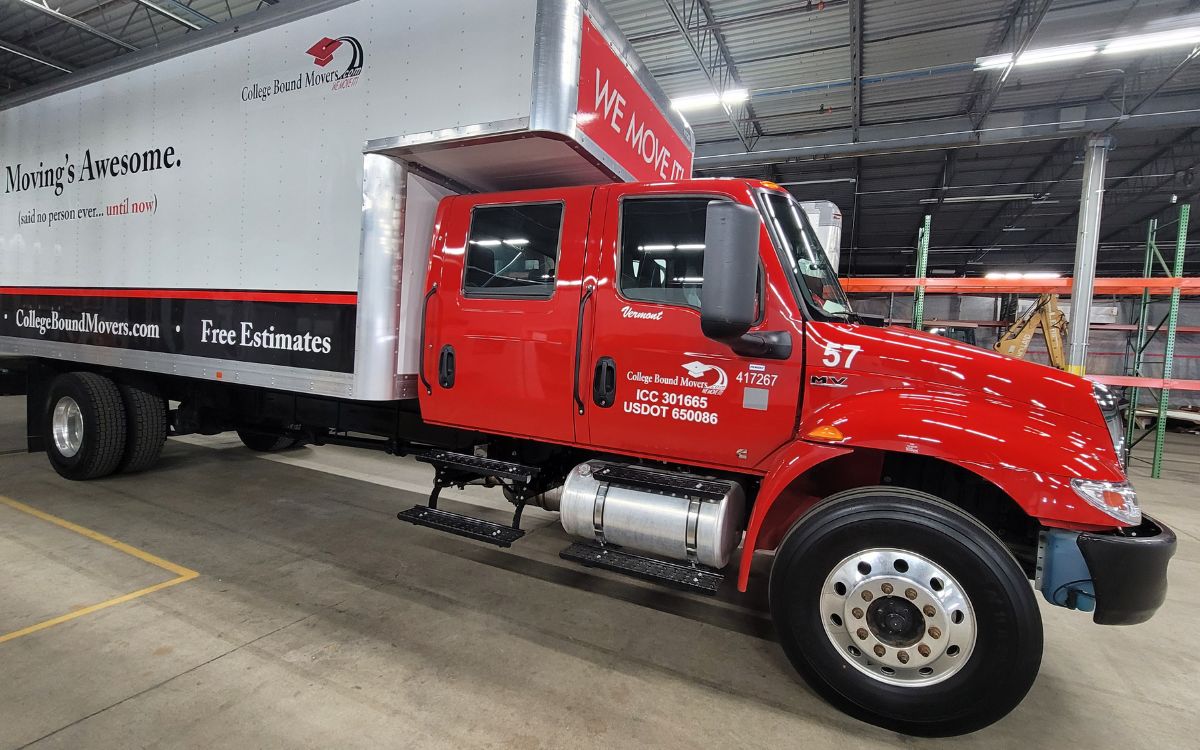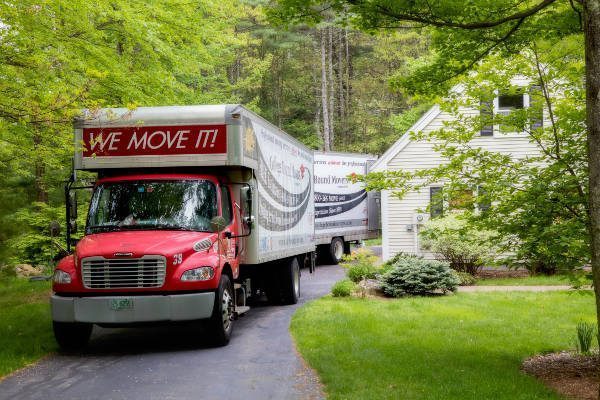
How to downsize your home before a move is one of the most common questions while contemplating relocation. When you move into a home, you start adding furniture pieces, décor, and extra items to fill your big home. The longer you live in a home, the more things you accrue.
Moving is always an adventure, but if you’ve been living in the same home for years, it’s easy to accumulate far more belongings than you need. Downsizing before a move not only lightens the load but also helps you start fresh in your new home with less stress and clutter. Whether you’re relocating to a smaller house in Manchester, NH, an apartment in Boston, MA, or a retirement condo near the Seacoast, taking the time to declutter and organize can make the moving process smoother and more cost-effective.
At College Bound Movers, we’ve been helping families and businesses relocate across New Hampshire and New England since 1991. Our team has seen it all — from attics full of forgotten keepsakes to garages stuffed with decades’ worth of tools. Based on our 30+ years of experience, here are the most effective steps for downsizing your home before a move.
1. Declutter Your Closets and Clothing Before Moving
Look at your closet….do you actually wear all of your clothes? Really consider if you need the clothes that you have in your closet. It might be time to downsize your wardrobe and get rid of all of the items in your that you no longer need!
Closets are often the biggest culprits when it comes to clutter. If you haven’t worn a piece of clothing in the past year, chances are you don’t really need it. Before packing:
- Sort by season: Donate or sell out-of-season clothing you won’t wear in your new home.
- Follow the “one-year rule”: If it hasn’t been worn in a year, let it go.
- Check condition: Torn, stained, or outdated items can be recycled or donated.
In college towns like Durham, NH, or Amherst, MA, local charities often accept gently used clothing for students and families in need. Consider donating to organizations like Goodwill New England or Salvation Army Thrift Stores in Nashua or Portsmouth.

2. Clean Out and Organize the Garage
How much in your garage do you actually use? It is time to stop saying, “maybe someday I will need this” and start getting rid of things. Take a look at things and ask yourself honestly if you will indeed need the items sitting in your garage, shed or attic.
The garage is a hotspot for items we “might need someday.” Before you load up the moving truck, ask yourself whether you truly need that old camping gear, broken lawnmower, or stacks of paint cans.
Tips for purging the garage:
- Get rid of duplicate tools (do you really need three hammers?).
- Properly dispose of hazardous materials like old paint or chemicals.
- Donate bicycles, sporting goods, or exercise equipment that no longer get used.
If you’re relocating from Concord, NH, moving to an apartment in New England or New Hampshire, chances are you won’t need every lawn tool you’ve been holding onto. By downsizing now, you’ll save valuable space in your new home.
3. Evaluate What You’ll Need in Your New Home
There are many things in your current home that you will not need in your new place. Think about your new home and determine what you may or may not need.
Before packing, take the time to compare your current home with your new one. Are you moving from a single-family home in Bedford, NH, to a condo in Boston’s Back Bay? Do you still need snow shovels if you’re relocating south of New England?
Consider:
- Climate differences: Moving from snowy Hanover, NH, to milder climates means fewer winter tools and coats.
- Space restrictions: Apartments in cities like Cambridge, MA, may not have basements or large storage closets.
- Lifestyle changes: Downsizing often means simplifying — fewer knick-knacks, fewer “just in case” items.
4. Decide Which Furniture to Keep, Sell, or Donate

Think about all of the furniture in your home. Many people purchase their furniture to specifically fit the unique layout of their current home. Consider getting rid of all of your furniture and purchasing new furniture that will fit your downsized home.
Furniture takes up the most space in a moving truck, so it’s essential to be strategic.
Ask yourself:
- Does this piece fit the style or size of my new home?
- Is it worth the cost of moving?
- Could I replace it more affordably after the move?
Options for unwanted furniture:
- Sell through Facebook Marketplace, Craigslist NH, or consignment shops in towns like Keene or Exeter.
- Donate to local charities such as Habitat for Humanity ReStores across New England.
- Offer pieces to friends, neighbors, or family members before moving.
For families moving long-distance — say from New Hampshire to New York City — reducing bulky furniture can cut costs dramatically.
5. Use a Storage Unit for Items You Can’t Part With
Depending on the size of your new home you could consider renting out a storage unit to keep collections, family treasures or other things that you want to keep safe but don’t necessarily need in your home at all times. Therefore, you could downsize your home without feeling like you have to get rid of your family heirlooms.
Sometimes, you’re not ready to part with sentimental items, heirlooms, or seasonal gear. That’s where a storage unit comes in handy.
At College Bound Movers, we offer portable storage containers (self-storage) that give you flexibility. These containers are great for:
- Seasonal items like skis, snowboards, and beach gear.
- Family keepsakes you don’t want to move into a smaller home.
- Furniture you may want later but don’t have room for now.
Storage is especially helpful for families moving within New Hampshire’s Lakes Region or Seacoast towns like Hampton and Rye, where homes may have limited storage space.
6. Avoid Holding Onto Items for Future Generations
Many people (especially the older generation) keep many items to pass down to their children when they are no longer around. Don’t assume that your children and grandchildren will like some of your belongings.
It’s common for parents to save furniture, china, or collectibles thinking their kids will want them. In reality, younger generations often prefer modern, minimalist lifestyles.
Instead of saving “just in case”:
- Ask directly: See what items your kids or grandkids actually want.
- Donate the rest: Many local charities in Manchester and Merrimack welcome furniture and household items.
- Consider resale: Antique shops across New England, especially in Portsmouth, may take unique pieces.
Downsizing means embracing the present — not storing items for someone else’s future.
7. Sort and Shred Unnecessary Paperwork
It is time to go through all of your files, folders, and drawers and recycle/shred papers that you no longer need. You may not need a receipt from 30 years ago. Ask yourself, will I ever need this again?
Piles of paperwork can quickly fill boxes, and most of it isn’t necessary. Shredding and recycling before your move saves space and stress.
Keep:
- Tax returns (last 7 years).
- Legal documents (wills, property deeds).
- Active insurance policies.
Shred/Recycle:
- Old receipts.
- Expired warranties.
- Outdated bills and junk mail.
Many communities in New Hampshire, like Hooksett and Londonderry, host annual shred days where residents can dispose of documents securely.
8. Get Your Kids Involved in Decluttering Their Rooms
Things that mean nothing to you might mean a lot to your children. Make sure that you aren’t purging your kids’ rooms for them. Set up boxes where they can give things away, keep, or throw away.
Children’s rooms can be some of the hardest to downsize. Old toys, school projects, and clothes pile up quickly. To make the process easier:
- Give kids ownership: Let them choose what to keep, donate, or toss.
- Set limits: Use bins or boxes to define how much can come.
- Make it positive: Explain that donations may help other kids in need.
If you’re moving to family-friendly communities like Hanover, Durham, or Bedford, involving kids early helps them adjust emotionally while reducing clutter.
Plan Your Stress-Free Move With College Bound Movers

Downsizing your home before a move can be overwhelming, but with the right strategy, it becomes manageable — even liberating. By decluttering closets, clearing garages, rethinking furniture, and letting go of items you don’t need, you’ll save time, money, and stress when moving day arrives.
Since 1991, College Bound Movers has been the trusted choice for families and businesses moving across New Hampshire and New England. Whether you’re relocating within Manchester, downsizing to a condo in Boston, or planning a long-distance move across state lines, our experienced movers are here to help.
Why Choose College Bound Movers?
- Full-service solutions: Residential, commercial, storage, packing, and labor-only moving in New Hampshire, New England, and beyond.
- Local expertise: Deep knowledge of towns across New Hampshire and the wider New England region.
- Trusted reputation: Over 30 years serving the community with professionalism and care.
Contact College Bound Movers today to get a free moving estimate and schedule your stress-free move. Let us help you downsize with confidence and settle into your next home with ease.
Frequently Asked Questions
1. How do I start downsizing before a move?
Begin with small areas like closets or drawers. Sort items into “keep, donate, or toss.” Starting early gives you more time to make decisions and reduces stress on moving day.
2. What should I do with unwanted furniture when downsizing?
You can donate furniture to local charities like Habitat for Humanity ReStores in New England, sell items on Facebook Marketplace, or schedule pick-ups from local thrift shops in New Hampshire towns like Manchester or Nashua.
3. Is it worth renting a storage unit when moving?
Yes, storage units are ideal if you’re moving into a smaller home or apartment but aren’t ready to part with certain belongings. College Bound Movers offers portable storage containers across New Hampshire and New England for convenient self-storage.
4. How do I downsize sentimental items?
Limit sentimental items to a few meaningful keepsakes. For family heirlooms, ask children or relatives if they want them. If not, consider donating or selling them at antique shops in Portsmouth or Concord.
5. What paperwork should I keep when decluttering?
Keep essential documents such as tax returns (last seven years), legal paperwork, and insurance policies. Shred expired warranties, old receipts, and outdated bills before your move.
6. How do I help my kids downsize their belongings before a move?
Involve them in the process by letting them choose what toys, clothes, or school projects to keep. Setting clear limits, like one bin per category, helps kids feel in control and reduces clutter.
7. Why should I choose College Bound Movers for downsizing help?
Since 1991, College Bound Movers has been the trusted choice for residential and commercial moves across New Hampshire and New England. With services like packing, portable storage, and labor-only moving, we make downsizing stress-free and affordable.






















